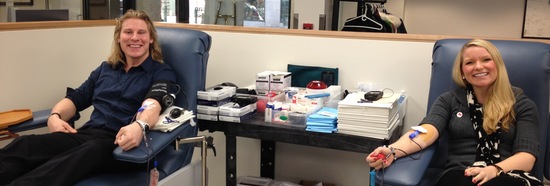Last weekend I gave my seventh blood donation through the American Red Cross. As I sat in the chair next to my girlfriend Pamela (Pediatric Nurse), I thought about the significance of what we were doing.
Where would our blood be going? Who would be helped by it? A mother? A father? A son or daughter? A baby? An adult? A person battling cancer, sickle cell disease or maybe a person involved in a car accident?
A chill ran down my spine as I thought about the lifesaving power that blood donations have for people who need transfusions. I reflected on my time in the ICU in 2004 when I needed 36 transfusions to stay alive, and I thought about the sick babies and young children that Pamela takes care of on a daily basis.
I knew in that moment, that our blood was going to help someone in need.
Quick Facts About the Blood Donation Process
- Blood donation is a simple, four-step process: registration, medical history and mini-physical, donation and refreshments. It is a safe process, and a sterile needle is used only once for each donor and then discarded.
The actual blood donation typically takes less than 10-12 minutes. The entire process, from the time you arrive to the time you leave, takes about an hour and 15 minutes. The average adult has about 10 pints of blood in his body. Roughly one pint is given during a donation. A healthy donor may donate red blood cells every 56 days, or double red cells every 112 days. There are four types of transfusable products that can be derived from blood: red cells, platelets, plasma and cryoprecipitate. Typically, two or three of these are produced from a pint of donated whole blood -- hence each donation can help save more than one life.Quick Facts About Blood Donors
- Half of Red Cross blood donors are male, and half are female.
- Only 7 percent of people in the United States. have type O-negative blood type, which is known as the universal blood type. Blood that is type O-negative can be given to people of all blood types. Type O-negative blood is needed in emergencies before the patient's blood type is known and with newborns that need blood.
Quick Facts About Red Cross Blood Services
- The Red Cross supplies approximately 40 percent of the nation's blood supply.
The Red Cross provides blood for patients in nearly 3,000 hospitals and transfusion center across the United States. Eighty percent of the blood donations given to the Red Cross are collected at blood drives set up at community organizations, companies, high schools, colleges, places of worship or military installations. The remaining 20 percent are collected at Red Cross blood donation centers.- You don't need a special reason to give blood; you just need your own reason. Some of us give blood because we were asked by a friend. Some know that a family member or a friend might need blood some day. Some believe it is the right thing we do.
The number one reason donors say they give blood is because they "want to help others." (I donate because I was one of these people that needed help in the summer of 2004.) Whatever your reason, the need is constant and your contribution is important for a healthy and reliable blood supply. And you'll feel good knowing you've helped change a life.To learn more about blood donation and the Red Cross, please visit redcross.org or call 1-800-RED CROSS (1-800-733-2767).
Support HuffPost
Our 2024 Coverage Needs You
Your Loyalty Means The World To Us
At HuffPost, we believe that everyone needs high-quality journalism, but we understand that not everyone can afford to pay for expensive news subscriptions. That is why we are committed to providing deeply reported, carefully fact-checked news that is freely accessible to everyone.
Whether you come to HuffPost for updates on the 2024 presidential race, hard-hitting investigations into critical issues facing our country today, or trending stories that make you laugh, we appreciate you. The truth is, news costs money to produce, and we are proud that we have never put our stories behind an expensive paywall.
Would you join us to help keep our stories free for all? Your contribution of as little as $2 will go a long way.
Can't afford to donate? Support HuffPost by creating a free account and log in while you read.
As Americans head to the polls in 2024, the very future of our country is at stake. At HuffPost, we believe that a free press is critical to creating well-informed voters. That's why our journalism is free for everyone, even though other newsrooms retreat behind expensive paywalls.
Our journalists will continue to cover the twists and turns during this historic presidential election. With your help, we'll bring you hard-hitting investigations, well-researched analysis and timely takes you can't find elsewhere. Reporting in this current political climate is a responsibility we do not take lightly, and we thank you for your support.
Contribute as little as $2 to keep our news free for all.
Can't afford to donate? Support HuffPost by creating a free account and log in while you read.
Dear HuffPost Reader
Thank you for your past contribution to HuffPost. We are sincerely grateful for readers like you who help us ensure that we can keep our journalism free for everyone.
The stakes are high this year, and our 2024 coverage could use continued support. Would you consider becoming a regular HuffPost contributor?
Dear HuffPost Reader
Thank you for your past contribution to HuffPost. We are sincerely grateful for readers like you who help us ensure that we can keep our journalism free for everyone.
The stakes are high this year, and our 2024 coverage could use continued support. If circumstances have changed since you last contributed, we hope you’ll consider contributing to HuffPost once more.
Already contributed? Log in to hide these messages.


